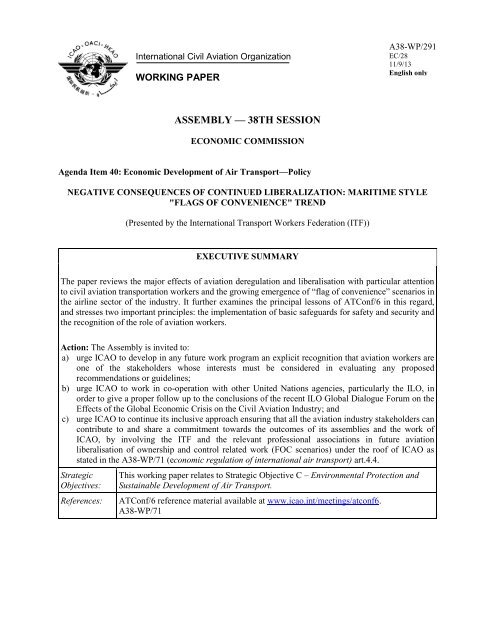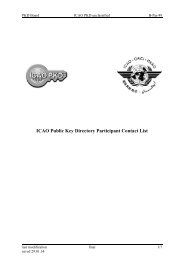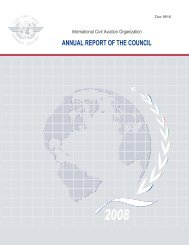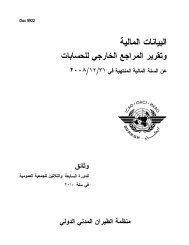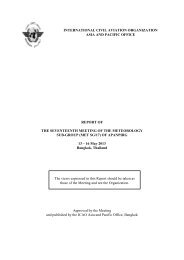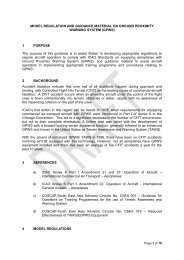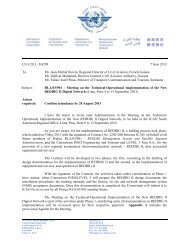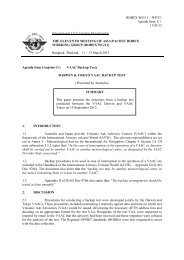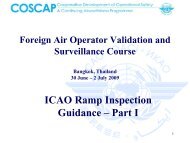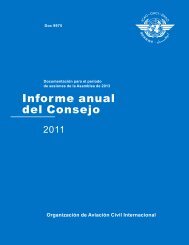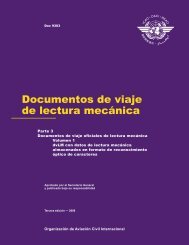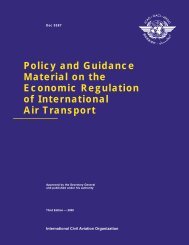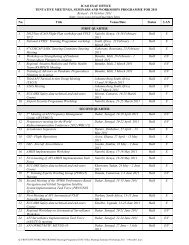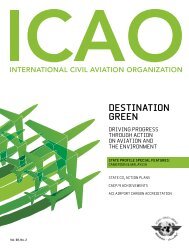ASSEMBLY — 38TH SESSION - ICAO
ASSEMBLY — 38TH SESSION - ICAO
ASSEMBLY — 38TH SESSION - ICAO
You also want an ePaper? Increase the reach of your titles
YUMPU automatically turns print PDFs into web optimized ePapers that Google loves.
International Civil Aviation Organization<br />
WORKING PAPER<br />
A38-WP/291<br />
EC/28<br />
11/9/13<br />
English only<br />
<strong>ASSEMBLY</strong> <strong>—</strong> <strong>38TH</strong> <strong>SESSION</strong><br />
ECONOMIC COMMISSION<br />
Agenda Item 40: Economic Development of Air Transport<strong>—</strong>Policy<br />
NEGATIVE CONSEQUENCES OF CONTINUED LIBERALIZATION: MARITIME STYLE<br />
"FLAGS OF CONVENIENCE" TREND<br />
(Presented by the International Transport Workers Federation (ITF))<br />
EXECUTIVE SUMMARY<br />
The paper reviews the major effects of aviation deregulation and liberalisation with particular attention<br />
to civil aviation transportation workers and the growing emergence of “flag of convenience” scenarios in<br />
the airline sector of the industry. It further examines the principal lessons of ATConf/6 in this regard,<br />
and stresses two important principles: the implementation of basic safeguards for safety and security and<br />
the recognition of the role of aviation workers.<br />
Action: The Assembly is invited to:<br />
a) urge <strong>ICAO</strong> to develop in any future work program an explicit recognition that aviation workers are<br />
one of the stakeholders whose interests must be considered in evaluating any proposed<br />
recommendations or guidelines;<br />
b) urge <strong>ICAO</strong> to work in co-operation with other United Nations agencies, particularly the ILO, in<br />
order to give a proper follow up to the conclusions of the recent ILO Global Dialogue Forum on the<br />
Effects of the Global Economic Crisis on the Civil Aviation Industry; and<br />
c) urge <strong>ICAO</strong> to continue its inclusive approach ensuring that all the aviation industry stakeholders can<br />
contribute to and share a commitment towards the outcomes of its assemblies and the work of<br />
<strong>ICAO</strong>, by involving the ITF and the relevant professional associations in future aviation<br />
liberalisation of ownership and control related work (FOC scenarios) under the roof of <strong>ICAO</strong> as<br />
stated in the A38-WP/71 (economic regulation of international air transport) art.4.4.<br />
Strategic<br />
Objectives:<br />
References:<br />
This working paper relates to Strategic Objective C – Environmental Protection and<br />
Sustainable Development of Air Transport.<br />
ATConf/6 reference material available at www.icao.int/meetings/atconf6.<br />
A38-WP/71
A38-WP/291<br />
EC/28<br />
- 2 -<br />
1. INTRODUCTION<br />
1.1 The International Transport Workers' Federation (ITF) is an international trade union<br />
federation of transport workers' unions. It consists of 654 independent trade union organisations<br />
representing 4.5 million transport workers in 151 countries. It is one of several Global Union Federations<br />
allied with the International Trade Union Confederation (ITUC). The ITF represents over 617,000 civil<br />
aviation workers world wide and speaks for aviation workers around the world.<br />
1.2 The purpose of this paper is to review the lessons of aviation deregulation and<br />
liberalisation to date; identify the key principles agreed on the Sixth Worldwide Air Transport Conference<br />
(ATConf/6); and to make concrete and practical recommendations to respond to the needs and interests of<br />
an important group of stakeholders in the international air transportation industry who are all too often<br />
forgotten or ignored in debates about extending deregulation and liberalisation – namely, civil aviation<br />
transportation workers.<br />
2. THE LESSONS OF AVIATION DEREGULATION AND LIBERALIZATION<br />
2.1 As the ITF introduced to the ATConf/6 (WP/99) there is also growing evidence that<br />
airlines under liberalisation are increasingly re-structuring their operations to reflect the classic maritime<br />
“flags of convenience” (FOC) scenarios.<br />
2.2 The ITF, as a multi-modal organization, has intimate experience with the consequences of<br />
“flagging out” in the maritime sector. In fact, the ITF invented the term “flags of convenience” back in<br />
1958. In that sector, the “unbundling” of ownership, nationality and safety oversight and standards have<br />
allowed some ship-owners to impose the lowest possible employment standards and conditions for their<br />
workers and the most relaxed safety standards and oversight for their operations.<br />
2.3 In the maritime sector, ships and fleets can be “flagged out” to countries (including<br />
land-locked nations with no maritime tradition) that offer tax avoidance, lower-cost safety and labour<br />
standards and conditions, and inadequate safety supervisory and inspection structures. “Flagging out” is<br />
generally driven by the desire to save costs (including paying lower taxes) or to escape effective<br />
regulatory control by the State in which the vessel or fleet is beneficially owned. It is the ultimate<br />
privatization of regulation. If a ship-owner does not like what the regulator is doing, it quits the flag and<br />
finds a more convenient or compliant one.<br />
2.4 The growing number of parallels in today’s civil aviation to traditional maritime<br />
“flagging out” scenarios is striking. Offshore registries for civil aviation aircraft exist and are growing.<br />
Offshore registries for private aircraft also exist. The rationale for such offshore registration is related to<br />
lowering direct and indirect taxes (e.g. Europe VAT is 20.5 per cent compared to none in some registries),<br />
lower insurance costs and less bureaucracy.<br />
2.5 Airlines are using “open skies” agreements to choose creatively whether to be regulated<br />
and supervised by local or home-based regulation, opening the civil aviation sector to the risk of social<br />
dumping, safety dumping, and reduced oversight as regulators should not be “competing” for registering<br />
an aircraft.<br />
2.6 As a result, the sustainability of the air transport industry is now in jeopardy with<br />
increasing turmoil and worker resistance to such employer tactics.
- 3 -<br />
A38-WP/291<br />
EC/28<br />
3. THE CONCLUSIONS OF ATCONF/6<br />
3.1 Based on this history of aviation deregulation and liberalization, one of the ITF’s<br />
priorities has been to mitigate the worst effects of the negative safety and economic consequences for<br />
aviation workers and passengers.<br />
3.2. During the ATConf/6, the ITF was not alone in expressing concerns about “flags of<br />
convenience” entering the air transport industry, or in raising questions about the capacity of the<br />
nationally based regulatory structures to provide effective safety oversight of globalizing air transport<br />
operators and multinational enterprises.<br />
3.3 As a result, the Conference concluded: “liberalization is a means and process, not an end.<br />
The objective of regulatory evolution is to create a favourable environment in which international air<br />
transport may develop and flourish in an orderly, efficient, economical and sustainable manner, without<br />
compromising safety and security, while respecting social and labour standards” (2.1 3.1.b). This has now<br />
become a more pressing matter as some of the worst features of “flags of convenience” operations have<br />
become increasingly prevalent in aviation.<br />
3.4 Together with the use of FOC practices in civil aviation industry, there are many serious<br />
issues for discussion before the Assembly and many challenges face all stakeholders in the years ahead.<br />
ITF believes that these will best be met through the inclusive approach adopted by <strong>ICAO</strong>, an approach<br />
that ensures that all the aviation industry stakeholders can contribute to and share a commitment towards<br />
the outcomes of this Assembly and the work of <strong>ICAO</strong>.<br />
3.5 The Conference’s recommendations state that “each State may choose its own path and<br />
pace in liberalization of air carrier ownership and control, and that safety and security remain of<br />
paramount importance in any regulatory change. Due consideration should also be given to the interest of<br />
all stakeholders, including that of labor” (2.2.3.1.c).<br />
3.6 The Conference’s recommendations include the following:<br />
a) “c) <strong>ICAO</strong> should initiate work on the development of an international agreement to<br />
liberalize air carrier ownership and control, taking into consideration safety and<br />
security concerns, the principle of reciprocity, the need to allow a gradual and<br />
progressive adaptation with safeguards, the need to take account of regional<br />
experiences, the requirements of various States’ domestic laws, and the effects on all<br />
stakeholders, including labour;” and<br />
b) “d) <strong>ICAO</strong> should involve all parties concerned in the development of the<br />
international agreement, and should undertake consultation with experts, States,<br />
aviation stakeholders and interested organizations” (2.2/1 c) and 2.2/1d)).<br />
3.7 Furthermore, A38-WP/71 presented by the <strong>ICAO</strong> Council states: “The Organization will<br />
engage and cooperate with Member States, industry, international organizations and other stakeholders in<br />
advancing the objective of economic development of air transport. It will foster collaboration with other<br />
international organizations to address emerging issues of common interest in the air transport field” (4.4).
A38-WP/291<br />
EC/28<br />
- 4 -<br />
4. CONCLUSION<br />
4.1 In light of the discussion above, the following conclusions may be drawn:<br />
a) air transport workers have been used repeatedly and increasingly since 2000 as the<br />
primary shock absorbers for managing the effects of deregulation, liberalization, the<br />
periodic business cycles and external shocks in the industry, often with devastating<br />
social consequences;<br />
b) there is growing evidence that airlines under liberalisation are gradually more restructuring<br />
their operations to reflect the classic maritime “flags of convenience”<br />
scenarios; and<br />
c) in the face of these developments the safety and security aspects of liberalisation and<br />
the need for the participation of all stakeholders in the evolution of the economic<br />
regulation of the industry should be recognized and a more balanced view of the<br />
social, safety and security aspects of aviation deregulation and liberalisation should<br />
be adopted.<br />
<strong>—</strong> <strong>—</strong> <strong>—</strong> <strong>—</strong> <strong>—</strong> <strong>—</strong>


